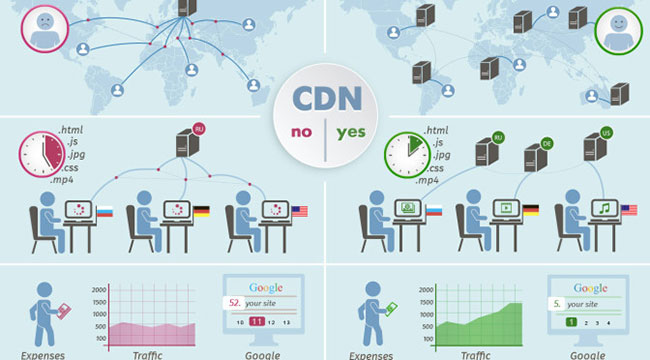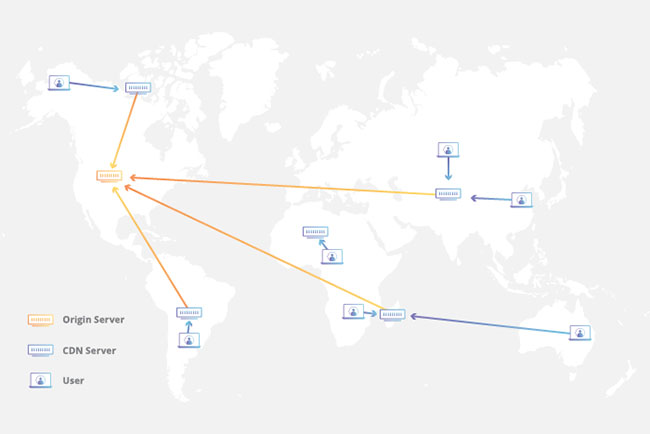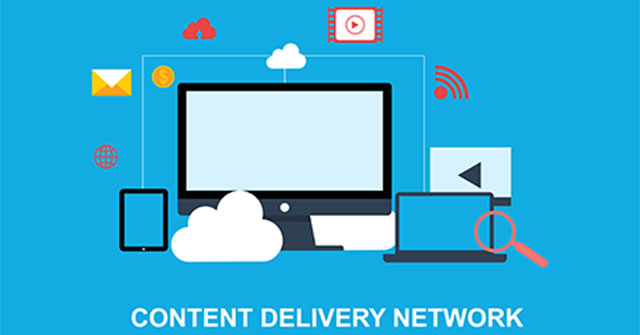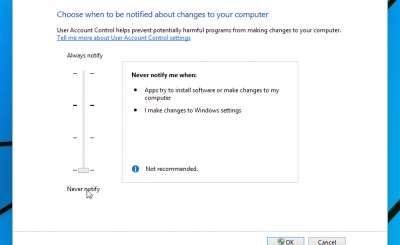Content Delivery Networks (CDN) is like the backbone of the Internet, responsible for distributing content. You may not have known that each of us interacts with CDN every day: Reading news articles, shopping online, watching YouTube videos or watching social media feeds.
What is CDN?
Content Delivery Networks (CDN) refers to a group of geographically distributed servers that work together to deliver Internet content fast.

The CDN allows for fast transmission of the content needed to load Internet content, including HTML pages, Javascript files, stylesheets, images and videos. The popularity of CDN services continues to grow, and today, the majority of web traffic is served through CDNs, including traffic from major websites like Facebook, Netflix and Amazon.
Properly configured CDNs can also help protect websites against some common malicious attacks, such as distributed denial of service (DDOS) attacks.
Is the CDN the same as a web host?
Although the CDN does not host the content and cannot replace the need for web hosting, it does improve website performance. Many websites struggle to meet their performance needs with traditional hosting services, which is why they choose a CDN.
By using caching to reduce hosting bandwidth, help avoid service interruptions and improve security, a CDN is a popular choice to alleviate some of the problems associated with traditional web hosting.
What are the benefits of using a CDN?
While the benefits of using a CDN will vary depending on size and need, the main benefits most users have include:
1. Improve website loading time
By delivering the content closer to the website visitors, through the use of a nearby CDN server (among other optimization measures), the visitor can experience faster page load times. Since visitors tend to bounce off a slow loading website, the CDN will reduce the bounce rate and increase the amount of time people spend on the site. In other words, a faster website means more visitors will stay and stick around for longer.
2. Reduce bandwidth costs
The cost of consuming bandwidth to host the website is the primary cost for the website. Through caching and other optimization solutions, the CDN can reduce the amount of data that the origin server has to provide, thereby reducing hosting costs for the website owner.
3. Increase the availability of content
A large amount of traffic or hardware failure can disrupt the normal functioning of the website. Thanks to their distributed nature, CDNs are able to handle traffic and withstand hardware failures better than many native servers.
4. Improve website security
CDN can improve security by minimizing DDoS, improving security certificate, and performing other optimization solutions.
How does the CDN work?
Essentially, a CDN is a network of interlinked servers with the goal of delivering content as fast as possible, at no cost, as reliable and secure as possible. To improve speed and connectivity, the CDN will place multiple servers at exchange points between different networks.
These Internet exchange points (IXPs) are the primary locations where different Internet providers connect to provide access to traffic originating from many different networks. By having connectivity to these high-speed and highly connected locations, a CDN provider can reduce costs and time in high-speed data delivery.

In addition to placing the server in an IXP, the CDN takes a number of measures to optimize the standard client / server data transmission. The CDN places data centers in strategic locations globally, enhances security, and is designed to be sustained in the face of various types of Internet congestion and failure.
How does CDN improve website load time?
When it comes to loading web pages, users will quickly skip it if the site is slow. CDN services can help reduce load times in the following ways:
The globally distributed nature of the CDN means reducing the distance between the user and the site’s resources. Instead of having to connect to wherever the site’s root server is running, the CDN allows users to connect to the data center that is geographically closer. Less travel times mean faster service.
– Optimization of hardware and software such as efficient load balancing and SSD can help data reach users faster.
CDN can reduce the amount of data transferred by reducing the file size, through tactics such as shrinking and compressing files. Smaller file sizes mean faster load times.
CDN can also speed up websites that use TLS / SSL certificates by optimizing connection reuse and enabling TLS false start.
How does the CDN keep a website online?
Uptime is an important ingredient for anyone with Internet assets. Hardware failure and spike in traffic, caused by malicious attacks or just an increase in popularity, potentially crashing the web server and preventing users from accessing a website or service . A comprehensive CDN has a number of features that will minimize downtime:
Load balancing distributes network traffic evenly across a number of servers, making it easy to scale fast increases in traffic.
Smart failover provides uninterrupted service even when one or more CDN servers are offline due to hardware failure; failover can redistribute traffic to other operating servers.
In the event of a technical failure of the entire datacenter, the Anycast routing feature will forward the traffic to another available datacenter, ensuring that no users lose access to the website. .
How does CDN protect data?
Information security is an integral part of the CDN. The CDN is able to keep a website secure with a new TLS / SSL certificate which will ensure high standards of authentication, encryption, and integrity. Explore the security concerns surrounding the CDN and discover what can be done to securely deliver content.
See more:
Source link: What is CDN (Content Delivery Networks)?
– https://techtipsnreview.com/





